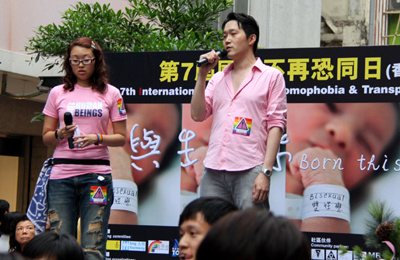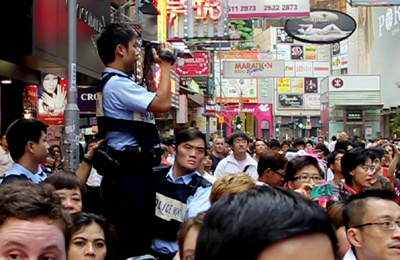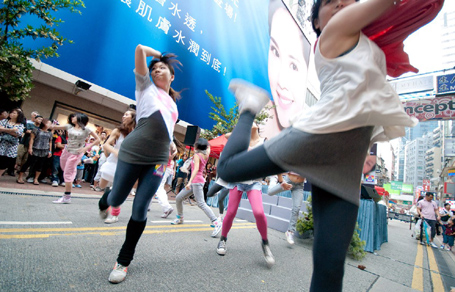The judicial review of the police action at IDAHO 2011 was dismissed by the court of first instance in Hong Kong last week. The judge, Mr Justice Lam, considered that the case hinged on technicalities of the entertainment and public safety ordinances and gave little consideration of the constitutional issues raised by the lawyers acting for 'T', the complainant.
Fridae earlier reported that a dance performance (top of page) held during the rally at in the busy commercial district of Causeway Bay came to an end midway after organisers were told by the police that they were not in possession of a permit for the dance performances although organisers say other similar events didn't require one.

Top, right: Chairman of the IDAHO Organizing Committee Reggie Ho.
Top of page: Performance by Dancing Angels that was stopped by the police.

Police video-recorded the proceedings on the stage before the dance
performances began. The video recording equipment was withdrawn
after the dancing stopped.
Vidler & Co. Solicitors who is representing the man, identified in proceedings only as "T", said in a statement that by challenging the constitutionality of the police action, the applicant is seeking a “declaration from the High Court that his rights of assembly, procession and expression under the Basic Law and the Bill of Rights were infringed.”
The review had been sought to challenge the action taken by the police to prevent a dance programme performed on the street as part of the celebration of IDAHO in May 2011. No entertainment licence had been sought for this performance as it was not thought to be an 'entertainment', only a political statement, and no such licence had been demanded for similar events in the past.
At the time, the Hong Kong police set up a stand in the centre of the crowd and filmed everyone present, leading many to fear that their identities would be recorded or released. The police action was felt to be intimidatory by many of those present.
T's solicitor, Michael Vidler, the well-known human rights lawyer, commented: "We will most definately be appealing the judgement, which was particularly weak as regards consideration of the constitutional issues that we raised. It was a stark case of a judge towing the government line.
"It became clear even before the case was heard that the judgement would be appealed by the government if we won as the Department Of Justice have taken the line that the Public Places of Entertainment Ordinance is a useful tool in dealing with awkward demonstrations."
It is felt in legal circles that this case will probably go to the Court of Final Appeal.












 列印版本
列印版本
















讀者回應
請先登入再使用此功能。